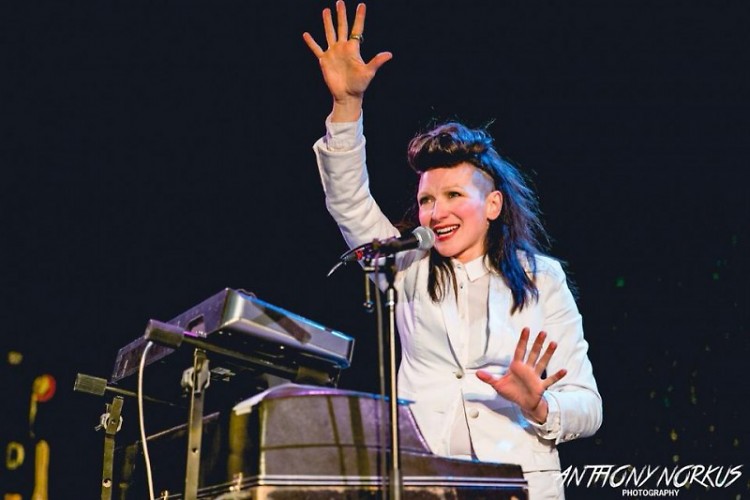"Erin, would you come up here?"
I was two hours into soundcheck with My Brightest Diamond, and Shara Worden (lead singer and songwriter) wanted me up onstage with her.
She hadn't "found the magic."
"I want you to stand beside me and see if you feel what I'm feeling," she said. "I want to see if you feel like there's something missing... because, I feel like there's something missing."
I stood beside her at her keyboard, and she began playing, and singing -- looking me right in the eyes, with a look of hope and confusion.
A minute into playing, she stopped. The drummer and bass player stopped.
Shara began to explain what she felt was missing.
It was different from any conversation I've ever had with any musician.
Not once did she say the word "frequencies." Nor "harmonics." Nor "octaves." No mention of "pitch" or "decibels."
In fact, if we weren't standing on a stage with instruments and microphones, you wouldn't have known she was talking about... music.
She said she felt disconnected.
She explained that she felt "separated from the other sounds on the stage, even though everyone was within 15 feet of one another."
"Do you know what I mean?" she asked.
I nodded. I did.
It was the first time a musician expressed what was wrong with the stage mix, without once referencing the mix. Without using any stock terms. Which was great for me, because I really don't understand the techncial terminology of sound engineering. I've been doing this for more than five years, but if you're a musician, and we've ever had a conversation about "frequencies," you should know that I was probably faking it.
Shara was using her hands to explain how she felt.
"It's like we're not even in the same room," she said. "There's no glue. Does that make sense?"
I nodded again. It did make sense. I was not faking it.
And I knew what we needed to do.
I looked toward the bassist and I pointed at his amp.
"I think he needs to turn that up," I said. "I think we need a lot more bass onstage, right?"
Shara nodded.
"Can we do that?" she asked.
"We can do anything," I said.
"We need to find the magic," she said.
I nodded.
"We need more reverb," I said.
"Can you do that?" she asked.
"Yes," I answered. "I'm going to do that, and let's see what happens."
She nodded. I ran back to the sound board, and made the changes.
Shara started playing the same song again.
A minute into it, she stopped. She raised her arm in the air and made a fist with her hand.
"WE FOUND THE MAGIC!"
In the space of five minutes, we had determined what was technically wrong with the mix, without any reference to technical terms. We got there by moving hands through the air; and by describing colors and shapes, in abstract. The conversation centered on how it's all supposed to make you feel. And there was talk of glue.
This conversation could've been about anything. And I think this is important, because perhaps all good art exists in this sort of "junction," where it could take almost any form, or be anything. A rhythm could be a sequence of dialogue, that could be a cello part in an orchestral piece, that could be a visual projection on the side of a building, that could be a dance film, that could be a rhythm.
I think when you're in that junction, you're in the actual circle. All other circles are peripheral. Technology is peripheral, in a circle outside the actual circle: it is a tool for transmitting what exists in the actual circle.
That was the unique and affirming thing about the conversation about the sound mix: it happened in the actual circle.
I'm sure everything Shara and I discussed and resolved to do... could be synthesized into a lexicon of decibels and frequencies. It could be converted into a language of technical terms. But I get lost there. I am not interested in that level of specificity, so I've never had the stamina to learn that much technique.
And furthermore, I'm starting to believe it is not a good idea to spend too much time there, because technique has a tendency to become a thing onto itself. Sometimes it can start to disconnect you from the actual thing, as you focus too much attention on it.
I learned how to mix sound because I had to. That is the only reason. It is a tool, to transmit what happens in the actual circle, through speakers. I know where the actual circle is. I was standing in it, with Shara, onstage, during soundcheck. And we affected our technique, without referencing anything technical.
And we found the magic.
The Rapidian, a program of the 501(c)3 nonprofit Community Media Center, relies on the community’s support to help cover the cost of training reporters and publishing content.
We need your help.
If each of our readers and content creators who values this community platform help support its creation and maintenance, The Rapidian can continue to educate and facilitate a conversation around issues for years to come.
Please support The Rapidian and make a contribution today.


